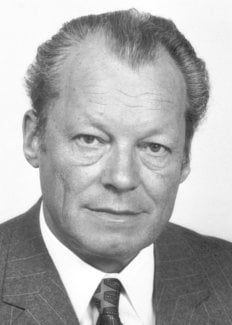Willy Brandt
Biographical

Willy Brandt was born in Lübeck, Germany, in December, 1913.
He was educated in Lübeck and in Oslo after escaping Nazi persecution in Germany.
After leaving Germany, he continued his work against Nazism through international cooperation and frequent visits to various European countries. He had close links with German anti-Nazi forces and for some time also lived in the Berlin underground.
In 1937 he worked in Spain as a political observer and representative of humanitarian relief organisations. In 1938 he was expatriated by Hitler’s government. In 1940, after the German occupation of Norway, he was captured, but not identified. Released as a Norwegian, he fled to Sweden. Until 1945 he lived in Stockholm.
In 1945/46 he worked as a correspondent in Germany for Scandinavian newspapers. In 1947 he became press officer at the Norwegian Mission in Berlin.
In 1948 he started his political career, holding various offices within the Social Democratic Party in Berlin and representing his party in the Berlin House of Representatives. He was also a member of the German Bundestag.
From 1957 to 1966 he was Mayor of Berlin.
| 1964-1987 | Chairman of the Social Democratic Party of Germany (SPD). |
| 1966-1969 | Foreign Minister and Vice-Chancellor. |
| 1969-1974 | Chancellor of the Federal Republic of Germany. |
| 1971 | Winner of the Nobel Peace Prize. |
| 1976-1992 | President of the international grouping of Social Democratic Parties (Socialist International). |
| 1977 | Chairman of the Independent Commission on International Development Issues. |
| 1979 | Elected to the European Parliament; Resigned from his seat in 1983. |
| 1987-1992 | Honorary Chairman of the SPD. |
| 1992, October 8 | Died of cancer in Unkel near Bonn. |
Willy Brandt was awarded numerous honorary degrees and awards and is the author of numerous books and articles.
Selected Bibliography
By Brandt
In Exile: Essays, Reflections and Letters 1933-1947. Philadelphia: University of Pennsylvania Press, 1971.
My Life in Politics. London: Hamish Hamilton, and New York: Viking Penguin, 1992. (Translated and abridged from the German edition of 1989, with a new preface, signed in September 1991.)
My Road to Berlin. As told to Leo Lania. Garden City, N.Y.: Doubleday, 1960.
Peace: Writings and Speeches. Bonn: Verlag Neue Gesellschaft, 1971. (Includes the translations of Brandt’s acceptance speech at Oslo and of his Nobel lecture.)
Other Sources
Binder, David. The Other German: Willy Brandt’s Life and Times. Washington, D.C.: New Republic Books, 1978.
Drath, Viola H. Willy Brandt: Prisoner of His Past. Radnor, Pa.: Chilton, 1975. (Highly critical.)
Prittie, Terence. Willy Brandt. Portrait of a Statesman. New York: Schocken, 1974. (Very favorable.)
* Received from Willy Brandt’s office in 1991. Updated.
This autobiography/biography was written at the time of the award and first published in the book series Les Prix Nobel. It was later edited and republished in Nobel Lectures. To cite this document, always state the source as shown above.
Willy Brandt died on October 8, 1992.
Nobel Prizes and laureates
Six prizes were awarded for achievements that have conferred the greatest benefit to humankind. The 14 laureates' work and discoveries range from quantum tunnelling to promoting democratic rights.
See them all presented here.
